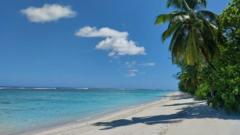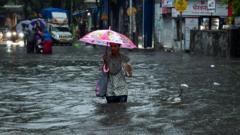Residents of Agalega Island, which has seen a surge in infrastructure development following a 2015 agreement with India, fear the transformation into a military outpost. As locals voice opposition and concerns about security and displacement, both governments claim the changes will benefit the island's socioeconomic development.
Agalega Island: Between Existence and Espionage

Agalega Island: Between Existence and Espionage
The tiny island of Agalega finds itself caught in a conflict of interests as India expands its presence amid resident concerns over militarization and potential eviction.
The tiny Mauritian island of Agalega is undergoing a profound transformation, raising concerns among its small population about the escalating militarization by foreign powers. Historically known for its coconut cultivation and fishing, Agalega's only access to the mainland was limited to quarterly ship deliveries from Mauritius, located 1,100 kilometers away. However, since a strategic collaboration was signed with India in 2015, the island has seen the construction of a significant 3,000-meter runway and new port facilities, igniting fears among residents of an impending military takeover.
Local handyman and reggae musician Arnaud Poulay, who recently left the island due to the changes, believes the development has compromised the island's peaceful existence: “I love my island, but the unveiling of the base made it unbearable for me,” he stated. Satellite imagery reveals extensive alterations to the environment, including the demolition of palm trees to accommodate new military infrastructure, including buildings capable of housing P-8I navy aircraft designed for maritime surveillance.
The scope of the changes has drawn the attention of experts and suspicious locals. Many islanders, some with personal histories tied to the Chagos islands’ forced evacuations, worry their homes may soon face a similar fate. "It feels like history is repeating itself," lamented Laval Soopramanien, president of the Association of Friends of Agalega. "The new facilities are potentially a precursor to restricted areas solely for Indian military use."
While both the Mauritian and Indian governments assert their intentions are centered around development and enhancing maritime security amid global tensions with China, locals argue the promised benefits have yet to materialize. Reports indicate that healthcare facilities are being restricted, and opportunities for local entrepreneurship remain stifled. A recent incident underscored this frustration when a local child suffered from severe burns but was denied access to the newly constructed Indian hospital, which was reportedly designated only for Indian nationals.
Despite public assurances from governmental spokespeople about the islanders' rights and benefits of the developments, many Agalegans express skepticism. Socio-economic plans proposed by Mauritius have yet to reveal concrete benefits, ever deepening the gap between government promises and community realities.
As the construction continues, the question lingers: will Agalega’s isolated population succeed in reclaiming their autonomy, or will the island succumb to the geopolitical tug-of-war in the Indian Ocean? With significant mistrust hovering over the island, residents remain uncertain about their future as they contest both domestic governance and foreign military ambitions.





















